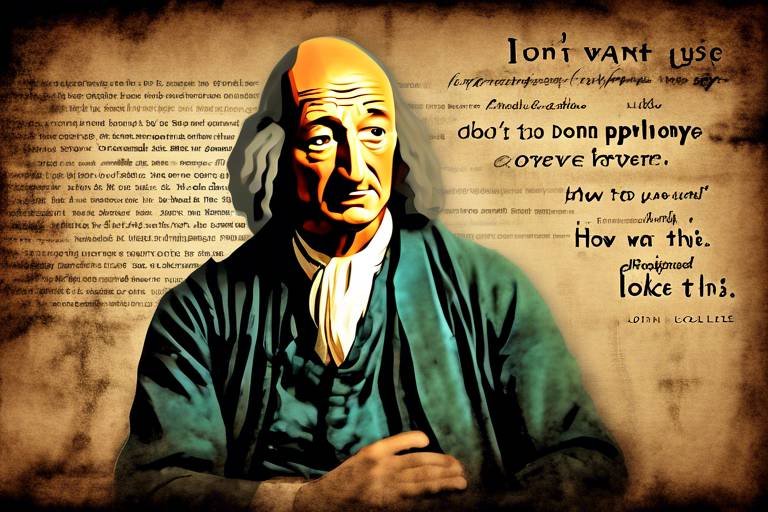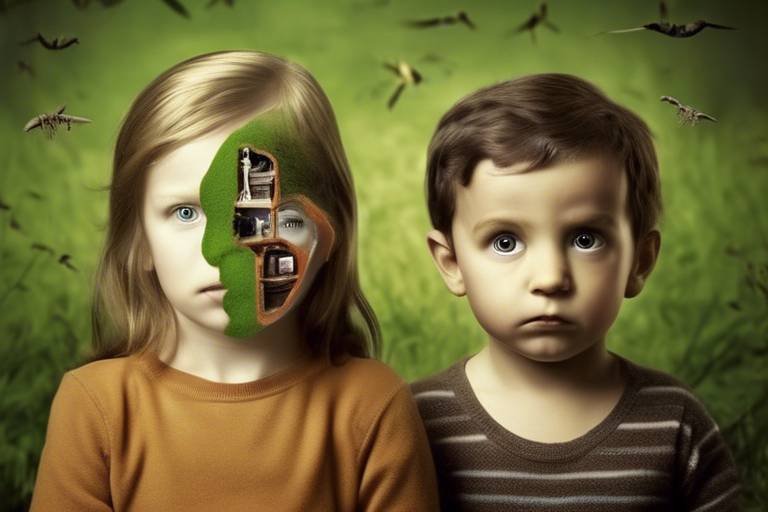The Role of Philosophy in Economic Theory
This article explores how philosophical concepts shape economic theories, influence decision-making, and contribute to ethical considerations in economics, ultimately enhancing our understanding of economic systems and human behavior. At first glance, philosophy and economics may seem like two separate realms, but they are intricately intertwined. Philosophy offers a lens through which we can examine the underlying assumptions and motivations that drive economic models and policies. It's like looking at the world through a pair of glasses that not only clarify vision but also reveal deeper truths about human nature and societal structures.
Imagine trying to navigate a complex maze without understanding its layout. That's what it's like to approach economics without a philosophical framework. By delving into the philosophical underpinnings of economic theories, we gain insight into why certain policies are favored over others and how they impact individuals and communities. For instance, when we discuss the concept of utility, we are not just talking about a mathematical function; we are engaging with the philosophical idea of what it means to live a good life and how to measure happiness.
The relationship between philosophy and economics is not merely academic; it has real-world implications. Policies crafted without ethical considerations can lead to significant social injustices. For example, if economic decisions are made solely based on profit maximization, we might see a disregard for environmental sustainability or workers' rights. This is where philosophy steps in, urging us to consider the broader picture and the moral dimensions of our economic choices. It challenges us to ask tough questions: What is the purpose of our economic system? Who benefits from it, and at what cost?
As we explore this intersection further, we will uncover how various philosophical theories, such as utilitarianism and social contract theory, provide frameworks for understanding economic behavior and decision-making. These theories not only inform economic models but also shape the ethical landscape in which economic actors operate. In essence, philosophy serves as the compass guiding economists through the murky waters of human behavior, societal values, and ethical dilemmas.
In the following sections, we will delve deeper into specific philosophical concepts and their implications for economic theory. From examining the role of ethics in economic decision-making to exploring the philosophical foundations of economic models, we will uncover how these ideas not only enhance our understanding of economics but also enrich our approach to addressing the challenges faced by modern economies.
- How does philosophy influence economic decision-making?
Philosophy provides the ethical framework and foundational principles that guide economic theories and policies, helping to clarify the motivations behind various economic models. - What is the significance of utilitarianism in economics?
Utilitarianism promotes actions that maximize overall happiness, which influences economic policies and welfare economics, particularly through cost-benefit analysis. - Why is social contract theory relevant to economics?
Social contract theory helps us understand the relationship between individuals and economic institutions, informing policies related to social justice and equity. - What is the difference between rational choice theory and behavioral economics?
Rational choice theory assumes individuals make decisions based on utility maximization, while behavioral economics incorporates psychological insights, challenging traditional notions of rationality.

The Intersection of Philosophy and Economics
This article explores how philosophical concepts shape economic theories, influence decision-making, and contribute to ethical considerations in economics, ultimately enhancing our understanding of economic systems and human behavior.
Philosophy and economics are more intertwined than many might initially perceive. At first glance, economics appears to be a strict discipline focused on numbers, markets, and policies. However, it is deeply embedded in philosophical thought, which provides the foundational principles that guide economic theories. This intersection is crucial because it helps us understand not only the mechanics of economic systems but also the motivations behind these systems. For instance, when economists create models to predict market behavior, they are often influenced by philosophical assumptions about human nature, such as whether individuals are inherently rational or driven by emotions.
To illustrate this connection, consider the various philosophical movements that have influenced economic thought:
- Classical Economics: Rooted in the ideas of philosophers like Adam Smith, this school of thought emphasizes the importance of individual self-interest and the invisible hand of the market.
- Marxism: Karl Marx's philosophical critique of capitalism has led to alternative economic theories that focus on class struggle and the distribution of wealth.
- Keynesian Economics: John Maynard Keynes introduced philosophical ideas about government intervention in the economy, challenging the notion that markets are always self-correcting.
By exploring these philosophical underpinnings, we can better appreciate the motivations behind various economic models and policies. For example, the debate between free markets and government intervention is not just an economic issue; it is fundamentally a philosophical one, rooted in differing beliefs about human nature and the role of the state. Understanding these philosophical perspectives allows us to critically evaluate economic policies and their implications for society.
Moreover, the ethical dimensions of economic decisions cannot be overlooked. Philosophy provides the tools to analyze the moral implications of economic actions, guiding policymakers to consider the broader impact of their decisions on society. For instance, when evaluating policies that affect income distribution, philosophical inquiry can help us ask critical questions: Who benefits? Who suffers? What is the fair way to distribute resources? By engaging with these questions, we not only enhance our understanding of economic systems but also cultivate a more just society.
In conclusion, the intersection of philosophy and economics is a vibrant field that enriches our understanding of both disciplines. By recognizing the philosophical foundations of economic theories, we can better navigate the complexities of economic decision-making and its ethical ramifications. This relationship invites us to think critically about our economic systems and encourages a more holistic approach to understanding human behavior in the context of economics.
- How does philosophy influence economic theories? Philosophy provides foundational principles that shape economic models, guiding our understanding of human behavior and ethical considerations in economic decisions.
- What are some key philosophical theories that impact economics? Key theories include utilitarianism, social contract theory, and rational choice theory, each offering different perspectives on human behavior and decision-making.
- Why are ethical considerations important in economics? Ethical considerations help policymakers evaluate the broader implications of their decisions, ensuring that economic practices promote fairness and social justice.

Ethical Considerations in Economic Theory
The world of economics is not just a realm of numbers and graphs; it is a complex interplay of values, beliefs, and ethical considerations. At its core, economic theory grapples with fundamental questions about how resources should be allocated, how wealth is distributed, and what constitutes a fair and just society. These questions are steeped in philosophical inquiry, making ethics an indispensable part of economic discourse. When we examine economic policies, we must ask ourselves: Who benefits? Who suffers? And what moral responsibilities do we have towards each other in an interconnected world?
Ethical considerations in economics can be broadly categorized into several key areas, including fairness, justice, and the impacts of economic decisions on societal well-being. For instance, when policymakers design welfare programs, they must consider not only the economic efficiency of such programs but also their fairness in terms of distribution. This is where concepts like equity and equality come into play. Are we providing equal opportunities for all, or are we merely maintaining the status quo that benefits a select few? These questions push us to reflect on the moral implications of our economic choices.
Moreover, the ethical dimensions of economic theory extend to the environment as well. In an era of climate change and ecological degradation, economists are increasingly called to account for the environmental impacts of economic activities. This has led to the emergence of new models that integrate sustainability into economic decision-making. The idea here is clear: we cannot pursue economic growth at the expense of our planet. The ethical imperative is to find a balance that promotes both economic development and environmental stewardship.
Furthermore, the concept of corporate social responsibility (CSR) has gained traction in modern economic discussions. Companies are no longer viewed merely as profit-maximizing entities; they are seen as social actors with responsibilities towards their employees, communities, and the environment. This shift in perspective raises essential ethical questions about the role of businesses in society. Are they doing enough to contribute positively, or are they primarily focused on their bottom line? This ongoing dialogue challenges traditional economic theories and encourages a more holistic view of economic success.
In summary, ethical considerations are not just an afterthought in economic theory; they are central to understanding how economic systems operate and how they can be improved. By integrating philosophical insights into economic analysis, we can foster a more equitable and just society. The challenge lies in translating these ethical considerations into actionable policies that truly reflect our values as a community.
- What is the importance of ethics in economics? Ethics guide economic decision-making, ensuring that policies consider fairness, justice, and societal well-being.
- How does corporate social responsibility relate to economic theory? CSR emphasizes that businesses have obligations beyond profit-making, impacting their role in society and economic systems.
- Can economic growth be achieved sustainably? Yes, by integrating environmental considerations into economic models, we can pursue growth while protecting our planet.

Utilitarianism and Economic Decisions
Utilitarianism, a philosophical theory that champions the idea of maximizing overall happiness, plays a pivotal role in shaping economic decisions. At its core, utilitarianism posits that the best action is the one that produces the greatest good for the greatest number of people. This principle not only influences individual choices but also serves as a guiding light for policymakers who must weigh the potential impacts of their decisions on society as a whole. Imagine a community grappling with the decision to build a new highway. A utilitarian approach would evaluate the benefits, such as reduced travel time and increased economic activity, against the drawbacks, like environmental degradation and displacement of residents. The goal here is to find a balance that maximizes societal welfare.
In practice, utilitarianism manifests itself in various economic policies, particularly in welfare economics. This branch of economics seeks to assess the economic well-being of individuals and society, often using utilitarian principles as a benchmark. For example, when governments consider implementing social programs, they typically conduct rigorous analyses to determine how these initiatives will affect the overall happiness of the population. The challenge, however, lies in quantifying happiness and well-being, as these concepts are inherently subjective.
One of the most practical applications of utilitarianism in economic decision-making is through cost-benefit analysis. This method involves comparing the expected costs of an action against its anticipated benefits, allowing decision-makers to visualize the trade-offs involved. A well-structured cost-benefit analysis can help illuminate whether a proposed policy will indeed lead to a net increase in societal happiness. For instance, if a government is considering investing in renewable energy, it would assess not only the financial costs but also the long-term benefits of cleaner air, health improvements, and job creation in the green sector. However, it's essential to recognize that while cost-benefit analysis is a powerful tool, it also has its limitations, particularly in capturing the emotional and social dimensions of well-being.
Despite its widespread application, utilitarianism is not without its critiques. Critics argue that this approach can sometimes overlook the rights and dignity of individuals in favor of the majority's happiness. For example, if a policy benefits the majority but severely harms a minority group, is it still justifiable under utilitarian principles? This dilemma raises significant ethical questions about equity and justice in economic decisions. Therefore, while utilitarianism provides a valuable framework for evaluating economic policies, it must be complemented by other ethical considerations to ensure a more holistic approach to economic decision-making.
In conclusion, utilitarianism significantly influences economic decisions by promoting the idea of maximizing overall happiness. However, as we navigate the complex landscape of economics, it is crucial to balance utilitarian principles with ethical considerations that respect individual rights and promote social justice. By doing so, we can foster an economic environment that not only seeks to enhance collective welfare but also safeguards the dignity and rights of all individuals.
- What is utilitarianism? Utilitarianism is a philosophical theory that suggests actions are right if they promote the greatest happiness for the greatest number of people.
- How does utilitarianism influence economic decisions? It encourages decision-makers to consider the overall happiness and welfare of society when formulating policies and making economic choices.
- What is cost-benefit analysis? Cost-benefit analysis is a method used to evaluate the economic pros and cons of a decision, comparing expected costs against anticipated benefits.
- What are the critiques of utilitarianism in economics? Critics argue that utilitarianism can neglect individual rights and the needs of minority groups in favor of the majority's happiness.

Cost-Benefit Analysis
Cost-benefit analysis (CBA) is a systematic approach used in economics to evaluate the strengths and weaknesses of alternatives in order to determine the best approach to achieve benefits while minimizing costs. At its core, CBA embodies the principles of utilitarianism, aiming to maximize overall societal welfare by comparing the expected costs of an action against its anticipated benefits. This analytical tool plays a pivotal role in decision-making processes across various sectors, including government policy, business investments, and public projects.
To understand CBA better, imagine you're trying to decide whether to invest in a new public park. You would consider the costs associated with building and maintaining the park, such as construction expenses, ongoing maintenance, and potential disruption during the building phase. On the flip side, you would evaluate the benefits, which could include increased community happiness, enhanced property values, and improved public health through recreational opportunities. By weighing these factors, decision-makers can make informed choices that ideally lead to the greatest net benefit for the community.
One of the most significant aspects of cost-benefit analysis is its reliance on quantifying both costs and benefits, which can often be challenging. Not everything can be easily measured in monetary terms. For example, how do you assign a dollar value to the joy a community feels from having a green space? To tackle this, economists often use various techniques, including:
- Monetary Valuation: Assigning a dollar value to non-market goods, such as environmental benefits or social gains.
- Surveys: Gathering data on people's willingness to pay for certain benefits, which can provide insight into the perceived value of a project.
- Market Analysis: Looking at similar projects and their outcomes to estimate potential benefits and costs.
Despite its utility, cost-benefit analysis is not without its limitations. Critics argue that it can oversimplify complex decisions and may overlook important qualitative factors. Additionally, the reliance on accurate data is crucial; poor data can lead to misguided conclusions. For instance, if the costs of a project are underestimated or the benefits overestimated, the analysis could lead to poor policy decisions. Thus, while CBA is a powerful tool, it should be used alongside other methodologies and qualitative assessments to provide a more comprehensive view.
In conclusion, cost-benefit analysis serves as a foundational element in economic decision-making, enabling policymakers and businesses to weigh their options effectively. By integrating philosophical principles with practical applications, CBA not only informs economic choices but also enhances our understanding of the broader implications of those choices on society. As we continue to navigate the complexities of economic systems, the importance of such analytical tools cannot be overstated.

Critiques of Utilitarianism
Utilitarianism, while influential in shaping economic decision-making, is not without its critiques. One of the most significant criticisms is its tendency to prioritize overall happiness at the expense of individual rights. Imagine a scenario where the happiness of the majority comes at a significant cost to a minority. This raises the question: is it justifiable to sacrifice the well-being of a few for the greater good? Critics argue that this approach can lead to morally questionable outcomes, where the rights and dignity of individuals are overlooked.
Another critique focuses on the practical challenges of measuring happiness and utility. How do we quantify something as subjective as happiness? The inherent difficulty in measuring individual satisfaction can lead to oversimplified economic models that fail to capture the complexities of human experience. Additionally, utilitarianism often assumes that individuals have equal capacity to experience happiness, which is not always the case due to varying circumstances and backgrounds.
Moreover, critics point out that utilitarianism can foster a short-term focus in economic policies. Policymakers might prioritize immediate benefits for the majority, neglecting long-term consequences that could harm future generations. For instance, consider environmental policies that favor short-term economic growth at the cost of sustainability. This raises ethical concerns about our responsibilities to future generations and the planet.
In summary, while utilitarianism provides a valuable framework for evaluating economic decisions, it also presents significant challenges. The balance between maximizing happiness and protecting individual rights remains a contentious issue. As we navigate the complexities of economic theory, it’s crucial to consider these critiques to develop more holistic and ethical economic frameworks.
- What is utilitarianism? Utilitarianism is a philosophical theory that suggests actions are right if they promote the greatest happiness for the greatest number of people.
- Why is utilitarianism important in economics? It helps guide decision-making processes by evaluating the potential outcomes of policies based on their ability to maximize overall welfare.
- What are some alternatives to utilitarianism in economic theory? Alternatives include deontological ethics, which focus on the morality of actions themselves rather than their outcomes, and virtue ethics, which emphasizes character and moral virtues.
- How can critiques of utilitarianism influence economic policies? By acknowledging its limitations, policymakers can strive for more balanced approaches that consider individual rights and long-term consequences alongside overall happiness.

Social Contract Theory in Economics
The Social Contract Theory plays a pivotal role in understanding the intricate relationship between individuals and economic institutions. At its core, this theory posits that individuals consent, either explicitly or implicitly, to form a society and abide by its rules in exchange for protection and the benefits of collective living. This idea can be likened to a mutual agreement where everyone agrees to give up certain freedoms in order to gain the security and stability provided by a structured society. In economic terms, this translates into the establishment of systems that govern resource allocation, distribution, and the overall functioning of markets.
When we consider economic policies through the lens of social contract theory, we see that they are often designed to reflect the collective will of the people. For instance, taxation can be viewed as a form of social contract where individuals contribute a portion of their earnings to fund public goods and services, such as education, healthcare, and infrastructure. This collective funding is essential for maintaining societal welfare and ensuring that everyone has access to the resources necessary for a decent standard of living. However, the fairness of such contributions often sparks debate, raising questions about equity and justice.
Moreover, social contract theory highlights the importance of social justice in economic systems. It challenges economists and policymakers to consider not only the efficiency of economic outcomes but also their fairness. For example, when crafting policies aimed at reducing poverty, the social contract perspective emphasizes the need to ensure that all individuals, especially the marginalized, have a voice in the decision-making process. This leads to a more equitable distribution of resources and opportunities, fostering a sense of community and shared responsibility.
To illustrate the application of social contract theory in economics, consider the following table that outlines key principles and their implications:
| Principle | Implication in Economics |
|---|---|
| Mutual Consent | Individuals agree to abide by societal rules for collective benefit. |
| Collective Responsibility | Shared contributions to public goods and services. |
| Equity and Justice | Policies must consider fairness and accessibility for all. |
| Social Welfare | Focus on improving the living standards of the entire community. |
In conclusion, the Social Contract Theory serves as a vital framework for analyzing economic policies and their impacts on society. It encourages a holistic view of economics, one that goes beyond mere numbers and statistics to embrace the ethical dimensions of economic decision-making. By incorporating the principles of social contract theory, we can foster a more just and equitable economic landscape that truly reflects the values of the society it serves.
- What is Social Contract Theory? - It is a philosophical concept that explains the agreement between individuals to form a society and abide by its rules for mutual benefit.
- How does Social Contract Theory relate to economics? - It influences economic policies by emphasizing the importance of collective responsibility and social justice.
- Can you provide an example of Social Contract Theory in action? - Taxation is a prime example, where individuals contribute to public goods in exchange for societal benefits.
- What are the implications of Social Contract Theory on economic policies? - It encourages policymakers to consider fairness and equity when designing economic systems.

The Philosophical Foundations of Economic Models
Economic models are more than just numbers and graphs; they are built on a series of philosophical assumptions about how humans behave and interact within society. At their core, these models reflect the beliefs we hold about human nature and the mechanisms that drive economic activity. For instance, many traditional economic theories are grounded in the idea that individuals are rational actors, making decisions that maximize their utility. This notion stems from a philosophical perspective known as rational choice theory, which posits that people weigh the costs and benefits of their choices before acting. It’s a bit like playing a game of chess; each move is calculated, with the ultimate goal being to achieve the best possible outcome.
However, the reliance on rationality as a cornerstone of economic models has sparked debate among scholars and practitioners alike. Critics argue that this perspective oversimplifies the complexities of human behavior. People are often influenced by emotions, social contexts, and cognitive biases, which can lead to decisions that deviate from what would be considered 'rational.' This is where behavioral economics comes into play, challenging the traditional views by integrating insights from psychology into economic theory. It’s like discovering that the chess player sometimes makes impulsive moves based on intuition rather than calculated strategy.
To understand these philosophical foundations more deeply, it’s essential to consider how they impact the design and application of economic models. For example, if we accept that individuals are inherently rational, we might develop policies that promote competition and efficiency. However, if we embrace a more nuanced view of human behavior, we might prioritize policies that account for social welfare and equity, recognizing that not all players in the economic game have the same resources or opportunities. This shift in perspective can lead to vastly different economic outcomes and policies.
Moreover, the philosophical underpinnings of economic models also influence how we interpret data and assess the effectiveness of various policies. For instance, if a model is based on the assumption of rationality, it may overlook important factors such as inequality or social justice. This is crucial because economic systems are not just about numbers; they are about people and their lived experiences. By acknowledging the philosophical dimensions of economic models, we can foster a more holistic understanding of economic phenomena and develop solutions that are both effective and equitable.
In conclusion, the philosophical foundations of economic models shape not only the theories we develop but also the policies we implement. Recognizing the interplay between philosophy and economics allows us to question our assumptions and strive for a more comprehensive understanding of human behavior and economic systems. Just as in life, where understanding ourselves and our motivations leads to better decisions, in economics, a deeper grasp of our philosophical beliefs can lead to more effective and just economic policies.
- What is the significance of philosophy in economics? Philosophy provides the foundational principles that guide economic thought, helping to clarify motivations behind economic models and policies.
- How does rational choice theory influence economic models? Rational choice theory assumes individuals make decisions to maximize utility, shaping the design and application of various economic policies.
- What is behavioral economics? Behavioral economics incorporates psychological insights into economic decision-making, challenging the traditional view of rationality.
- Why is it important to consider ethical implications in economic theory? Ethics inform economic practices, influencing decisions and policies that affect social justice and equity.

Rational Choice Theory
Rational Choice Theory is a fascinating concept that lies at the heart of economic analysis, positing that individuals make decisions by weighing the costs and benefits to maximize their utility. Imagine standing in a candy store, faced with a colorful array of sweets. You have a limited amount of money and a craving for something delicious. Rational Choice Theory suggests that you will evaluate each candy's taste, price, and how much you desire it before making your purchase. This process of evaluation is not just a casual thought; it’s a systematic approach that reflects a deeper philosophical understanding of human behavior.
At its core, Rational Choice Theory is grounded in the belief that humans are logical decision-makers. However, this assumption raises intriguing questions about the complexity of human motivations and the role of emotions in decision-making. Are we truly rational beings, or do our feelings often lead us astray? This theory simplifies human behavior into a neat package, but the reality is much messier. While the theory provides a framework for predicting economic behavior, it often overlooks the nuances of human psychology that can significantly influence choices. For instance, consider how a person might choose to buy a luxury item not because it maximizes utility, but because it fulfills a desire for status or prestige.
To better understand Rational Choice Theory, it's essential to examine its foundational assumptions. The theory operates on several key premises:
- Individuals have preferences: People have specific likes and dislikes that guide their choices.
- They seek to maximize utility: Individuals aim to achieve the highest satisfaction possible with their limited resources.
- Decisions are made with full information: The theory assumes that individuals have access to all relevant information to make informed choices.
However, the real world often deviates from these assumptions. People may not always have complete information, and their preferences can be influenced by social norms or peer pressure. This divergence has led to the emergence of alternative theories, such as Behavioral Economics, which integrates insights from psychology to provide a more comprehensive understanding of decision-making. In fact, Rational Choice Theory and Behavioral Economics can be seen as two sides of the same coin, each offering valuable insights into the complexities of human behavior.
Moreover, the implications of Rational Choice Theory extend beyond individual decision-making. It provides a lens through which we can analyze market behaviors, policy decisions, and even societal trends. For example, policymakers often rely on this theory to forecast how people will respond to changes in tax rates or subsidies. Understanding that individuals will adjust their behavior in response to incentives is crucial for designing effective economic policies. However, if the assumptions of Rational Choice Theory do not hold true in practice, the effectiveness of such policies may be compromised.
In conclusion, while Rational Choice Theory offers a robust framework for understanding economic decisions, it is essential to recognize its limitations. As we delve deeper into the complexities of human behavior, we must remain open to integrating other philosophical perspectives that enrich our understanding of economics. After all, the world of economics is not just about numbers and models; it's about the intricate tapestry of human experiences and choices that shape our society.

Behavioral Economics and Human Psychology
Behavioral economics is like a breath of fresh air in the often rigid world of traditional economic theory. It challenges the long-held belief that humans are perfectly rational beings who always make decisions that maximize their utility. Instead, it dives into the messy, complicated realm of human psychology, revealing that our choices are influenced by a myriad of factors, including emotions, cognitive biases, and social pressures. Imagine trying to predict the weather based solely on a single temperature reading; it simply doesn’t capture the full picture. Similarly, traditional economics often overlooks the complexities of human behavior.
At its core, behavioral economics seeks to understand why people often make irrational choices that defy conventional economic logic. For instance, consider the phenomenon of loss aversion, which suggests that the pain of losing is psychologically more impactful than the pleasure of gaining. This principle can lead individuals to hold onto losing investments much longer than they should, simply out of fear of realizing a loss. Such insights not only enrich our understanding of economic decisions but also highlight the need for policies that account for these human quirks.
Moreover, behavioral economics employs various psychological theories to explain how people process information and make decisions. Concepts such as framing—how choices are presented—can significantly alter our decisions. For example, labeling a glass as "half full" versus "half empty" can influence a person's perception of a situation, leading to different choices. This interplay between presentation and perception is crucial for policymakers who aim to nudge individuals toward better financial decisions.
Incorporating insights from psychology allows economists to create more realistic models that reflect actual human behavior. For instance, the dual-process theory posits that we have two systems of thinking: one that is fast, intuitive, and emotional, and another that is slow, deliberate, and logical. Behavioral economics recognizes that both systems are at play in our decision-making processes, leading to outcomes that may not align with traditional economic predictions.
Ultimately, by blending economics with psychology, we gain a more nuanced understanding of economic phenomena. This approach not only enhances economic theories but also informs practical applications in areas like marketing, public policy, and personal finance. For example, by understanding common biases, financial advisors can better guide clients toward making sound investment choices. The implications of behavioral economics are vast, reshaping how we think about consumer behavior, market dynamics, and even public policy.
As we continue to explore this fascinating intersection of economics and psychology, it becomes increasingly clear that understanding human behavior is essential for crafting effective economic policies and models. The insights gained from behavioral economics not only enrich our academic discussions but also have real-world applications that can lead to improved decision-making and outcomes for individuals and societies alike.
- What is behavioral economics? Behavioral economics is a field that studies how psychological factors affect economic decision-making, challenging traditional assumptions of rationality.
- How does psychology influence economic decisions? Psychology influences economic decisions through cognitive biases, emotions, and social factors, leading to choices that may not align with traditional economic theories.
- What is loss aversion? Loss aversion is the psychological phenomenon where individuals prefer to avoid losses rather than acquiring equivalent gains, often leading to irrational decision-making.
- Why is framing important in decision-making? Framing affects how choices are perceived and can significantly influence decision outcomes, highlighting the importance of presentation in economic contexts.
Frequently Asked Questions
- How does philosophy influence economic theory?
Philosophy provides the foundational principles that guide economic thought. It shapes the assumptions economists make about human behavior, decision-making, and the ethical implications of economic policies. By understanding these philosophical underpinnings, we can better grasp the motivations behind various economic models and practices.
- What role does ethics play in economics?
Ethics is crucial in economics as it influences decisions and policies. Economic choices often have moral implications, and ethical frameworks help guide these decisions. For instance, utilitarianism encourages actions that promote the greatest happiness, while other ethical theories might focus on individual rights or justice, shaping how economists and policymakers approach issues like wealth distribution and resource allocation.
- Can you explain utilitarianism in economic decision-making?
Utilitarianism is a philosophical theory that suggests actions are right if they promote overall happiness. In economic decision-making, this translates to policies that aim to maximize societal welfare. It’s often applied in welfare economics, where the benefits and costs of policies are weighed to determine their impact on collective happiness.
- What is cost-benefit analysis and why is it important?
Cost-benefit analysis is a systematic approach used to evaluate the trade-offs of different economic actions. By comparing the expected costs and benefits, policymakers can make informed decisions that align with utilitarian principles. This tool is essential for assessing the societal impacts of various policies, ensuring that the benefits outweigh the costs.
- What are some critiques of utilitarianism in economics?
Despite its widespread use, utilitarianism faces critiques for prioritizing outcomes over individual rights. Critics argue that this focus can lead to justifying harmful actions against minorities if it benefits the majority. These concerns highlight the need for a more balanced approach that considers both collective welfare and individual rights in economic theory and practice.
- How does social contract theory relate to economics?
Social contract theory provides a framework for understanding the relationship between individuals and economic institutions. It emphasizes the agreements and responsibilities that form the basis of society, influencing economic policies related to social justice and equity. This theory helps us analyze how economic systems should operate to uphold fairness and collective well-being.
- What is rational choice theory?
Rational choice theory posits that individuals make decisions aimed at maximizing their utility based on available information. This theory relies on the assumption that people are rational actors, which profoundly influences economic analysis and policy-making. However, it also faces challenges from behavioral economics, which considers the psychological factors that affect decision-making.
- How does behavioral economics challenge traditional economic theories?
Behavioral economics integrates psychological insights into economic decision-making, challenging the traditional notion of rationality. It recognizes that human behavior is often influenced by biases, emotions, and social factors, which can lead to decisions that deviate from those predicted by rational choice theory. This approach enhances our understanding of economic phenomena by acknowledging the complexity of human behavior.



















